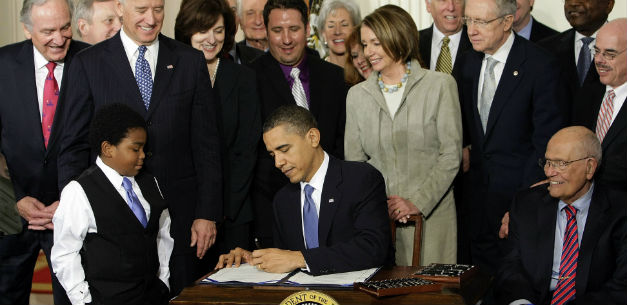The fate of health care reform depends on getting the House to pass the Senate’s health care bill. But anti-abortion House Democrats have demanded changes to the abortion language in the Senate legislation in order to secure their votes. And altering those provisions could be impossible, Senate Majority Leader Harry Reid’s spokesman said Tuesday.
That’s because Democrats are considering modifying the Senate bill via reconciliation—a procedural maneuver that only needs a simple majority and thus can’t be killed by a filibuster. But reconciliation rules forbid the inclusion of any provisions that have no effect on the budget. When the abortion language in the Senate bill was added as a last-minute compromise, the Congressional Budget Office actually certified that it had no budgetary effect. (Otherwise, the whole bill would have to be rescored.) That will make it very hard, if not impossible, to argue that the abortion provisions can be changed using the reconciliation process.
When I asked Reid’s spokesman, Jim Manley, whether the Majority Leader’s office understood the rules as preventing the Senate from altering the bill’s abortion language, he emailed back immediately. “I believe that is correct,” he wrote.
If Reid’s office stands by that stance, House Speaker Nancy Pelosi is in a real bind. Rep. Bart Stupak (D-Mich.), who pushed for the House bill’s strict limits on abortion coverage, has warned that he has 10 to 12 Democrats (including himself) who voted for the House bill but are committed to opposing the Senate bill’s abortion language. And without Stupak’s 10 to 12 lawmakers, getting the votes to pass the Senate bill in the House—even if other fixes are made using reconciliation—will be very, very hard. The original House bill only passed 220-215. Of the yes votes, Rep. Robert Wexler (D-Fla.) has since retired, and Rep. Joseph Cao (R-La.), will probably vote against the final bill. Some progressives, like Rep. Dennis Kucinich (D-Ohio), voted against the House bill but might be convinced to support a final compromise. And some Blue Dogs who opposed the House bill might have a change of heart. But are there 10 to 12 Democrats who will switch their votes? Unless Stupak is bluffing about the number of votes he has in his corner, health care reform is in serious trouble.
















